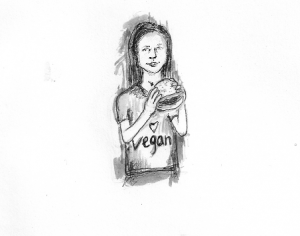Can Environmentalists Eat Meat With a Clear Conscience?
I consider myself an environmentalist. I also consider myself a hypocrite. It’s a constant inner battle, and I do my best to suppress and ignore this turmoil. I try to enjoy my life while we still have a planet to enjoy it on. This sounds pretty defeatist coming from someone who is going into a major that can be boiled down to the goal of “saving the planet.” But the more I study the state of Earth, the more pessimistic I become about the prospects of our descendents.
The reason I consider myself a hypocrite, however, is because of my own lapse in environmental responsibility. This reason is my decision to continue eating meat, despite the knowledge that this increases my carbon footprint by at least 20 percent. I do not do it because I need the protein, I do not do it to support local farms — I do it because it tastes good. Granted, I naturally gravitate towards restaurants who source locally and responsibly, but I don’t check up on the providers of the chicken in my Lo Mein from Yummy Dumpling, and I will eat a street-cart hot dog without protest.
I believe environmentalism comes from the awareness that, as a species, we are negatively affecting the planet and have the responsibility to do something about it. From that sense of responsibility and ownership comes the motivation to be an environmental advocate. I live my life trying to actively make decisions that alleviate my impact. I’m majoring in environmental studies in order to do something that leaves my home a bit better than it was when I arrived here — but I eat meat. Are environmentalists allowed to pick and choose?

In his book Eating Animals, Jonathan Safran Foer says that by eating meat we are cultivating a “blind spot.” He argues that people crave meat but do not need it to survive, and that “choosing not to do something that feels good can be a fuller expression of our humanity”. Many will cite the caveman argument — that human beings owe it to our apex predator prowess to eat the meat we evolved to digest — but have we as a species evolved again, morally? We have the ability to eat meat, but as stewards for our planet which we are rapidly changing, do we still hold the right?
Factory farming is the single greatest cause of pollution today — more than all industrial sources combined. A 2009 report by Worldwatch Institute cited that over 51% of man-made greenhouse gas emissions come from livestock production. Resources which should be siphoned into solving world hunger are instead used to subsidize corn. These crops are then fed to mangy, hormone-injected cows, crammed into windowless factories, which pollute the air, soil and groundwater. And all these animals have created more waste and manure than we know what to do with.
Michael Pollan, author of The Omnivore’s Dilemna, advocates the concept of “the ethical carnivore.” He himself eats meat, arguing that “when obtained from small farms where these animals are treated well, fed an appropriate diet, and generally allowed to express their creaturely character, I think the benefits of eating such meat outweigh the cost.”
Maybe this is true. There are plenty of environmental activists besides Pollan who eat meat, and it’s probably safe to say they consider themselves environmentalists. There are also vast amounts of vegans and vegetarians who consider themselves environmentalists merely for not eating meat, but also don’t do much else to lessen their carbon footprint.
In addition, people who eat meat in an environmentally-conscious way — only buying from local vendors or from restaurants who source responsibly — do their part in creating a shift in the market. If enough people eat as environmentally-conscious omnivores, maybe this is the path that has the most impact.
Maybe by living my life in an environmentally-conscious way, I can consider myself an environmentalist, but because I chose to eat meat, I shouldn’t consider myself a “good” environmentalist. Maybe eating meat will become my version of smoking cigarettes: something I partake in while I’m young and indestructible, until I grow older and wiser. When I realize that it’s too unhealthy for me to go on with it and finally give it up.
But maybe I, and all guilt-ridden environmentalist omnivores, can have the best of both worlds. I can eat meat as long as it comes with an environmental level of restraint — restricting myself to local and responsibly-sourced meat. It may be increasing my carbon footprint, but it is also supporting small farmers and is a much cleaner way to supply meat. What if we lived in a country where states were restricted to selling only the meat and produce grown in that state? That question lends itself to a much larger argument, but imagine how we would have to restructure local agriculture and how our diets would have to change. Not only that, but imagine the shifts in government support, the economy and farming monopolies.
Obviously this sort of restriction isn’t going to happen, nor will everyone just stop eating meat. But if environmentalist omnivores, such as myself, can create enough of a shift that local farms are given more money and support, maybe we can stop factory farms. And that’s a start.







Leave a Reply